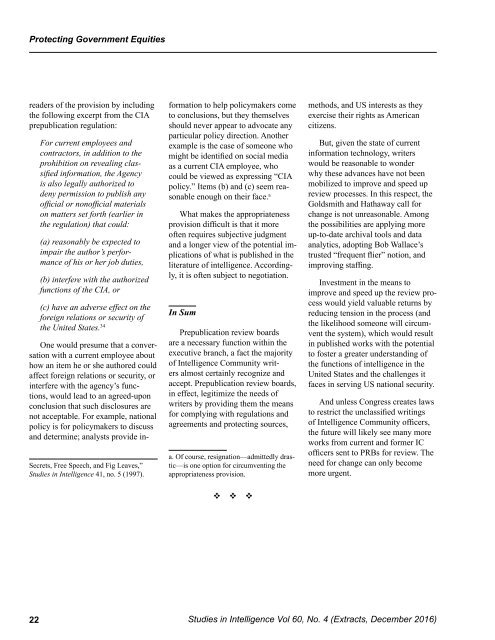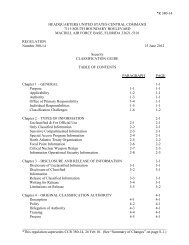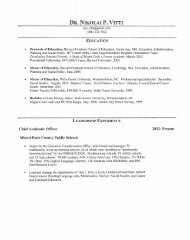extracts-studies-dec-2016
extracts-studies-dec-2016
extracts-studies-dec-2016
You also want an ePaper? Increase the reach of your titles
YUMPU automatically turns print PDFs into web optimized ePapers that Google loves.
<br />
Protecting Government Equities<br />
readers of the provision by including<br />
the following excerpt from the CIA<br />
prepublication regulation:<br />
For current employees and<br />
contractors, in addition to the<br />
prohibition on revealing classified<br />
information, the Agency<br />
is also legally authorized to<br />
deny permission to publish any<br />
official or nonofficial materials<br />
on matters set forth (earlier in<br />
the regulation) that could:<br />
(a) reasonably be expected to<br />
impair the author’s performance<br />
of his or her job duties,<br />
(b) interfere with the authorized<br />
functions of the CIA, or<br />
(c) have an adverse effect on the<br />
foreign relations or security of<br />
the United States. 34<br />
One would presume that a conversation<br />
with a current employee about<br />
how an item he or she authored could<br />
affect foreign relations or security, or<br />
interfere with the agency’s functions,<br />
would lead to an agreed-upon<br />
conclusion that such disclosures are<br />
not acceptable. For example, national<br />
policy is for policymakers to discuss<br />
and determine; analysts provide in-<br />
Secrets, Free Speech, and Fig Leaves,”<br />
Studies in Intelligence 41, no. 5 (1997).<br />
formation to help policymakers come<br />
to conclusions, but they themselves<br />
should never appear to advocate any<br />
particular policy direction. Another<br />
example is the case of someone who<br />
might be identified on social media<br />
as a current CIA employee, who<br />
could be viewed as expressing “CIA<br />
policy.” Items (b) and (c) seem reasonable<br />
enough on their face. a<br />
What makes the appropriateness<br />
provision difficult is that it more<br />
often requires subjective judgment<br />
and a longer view of the potential implications<br />
of what is published in the<br />
literature of intelligence. Accordingly,<br />
it is often subject to negotiation.<br />
In Sum<br />
Prepublication review boards<br />
are a necessary function within the<br />
executive branch, a fact the majority<br />
of Intelligence Community writers<br />
almost certainly recognize and<br />
accept. Prepublication review boards,<br />
in effect, legitimize the needs of<br />
writers by providing them the means<br />
for complying with regulations and<br />
agreements and protecting sources,<br />
a. Of course, resignation—admittedly drastic—is<br />
one option for circumventing the<br />
appropriateness provision.<br />
methods, and US interests as they<br />
exercise their rights as American<br />
citizens.<br />
But, given the state of current<br />
information technology, writers<br />
would be reasonable to wonder<br />
why these advances have not been<br />
mobilized to improve and speed up<br />
review processes. In this respect, the<br />
Goldsmith and Hathaway call for<br />
change is not unreasonable. Among<br />
the possibilities are applying more<br />
up-to-date archival tools and data<br />
analytics, adopting Bob Wallace’s<br />
trusted “frequent flier” notion, and<br />
improving staffing.<br />
Investment in the means to<br />
improve and speed up the review process<br />
would yield valuable returns by<br />
reducing tension in the process (and<br />
the likelihood someone will circumvent<br />
the system), which would result<br />
in published works with the potential<br />
to foster a greater understanding of<br />
the functions of intelligence in the<br />
United States and the challenges it<br />
faces in serving US national security.<br />
And unless Congress creates laws<br />
to restrict the unclassified writings<br />
of Intelligence Community officers,<br />
the future will likely see many more<br />
works from current and former IC<br />
officers sent to PRBs for review. The<br />
need for change can only become<br />
more urgent.<br />
v v v<br />
22 <br />
Studies in Intelligence Vol 60, No. 4 (Extracts, December <strong>2016</strong>)




